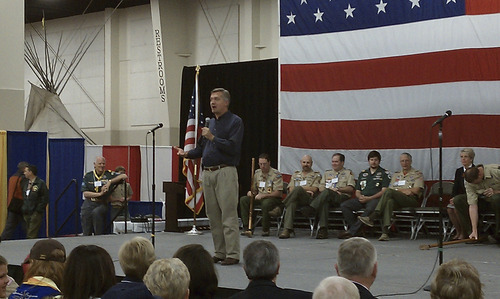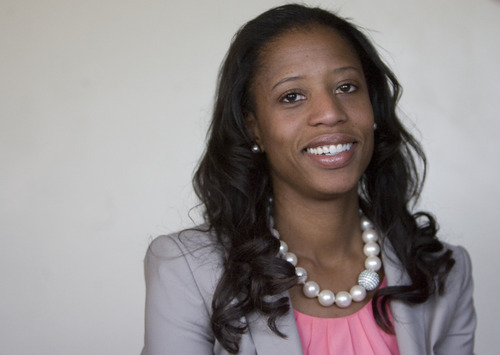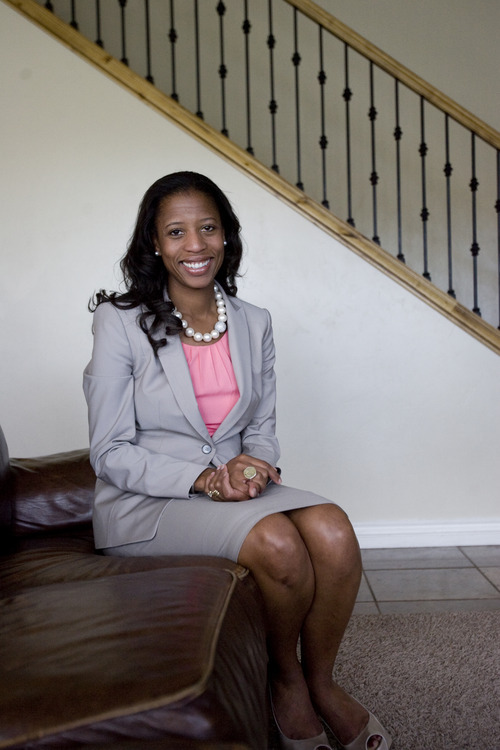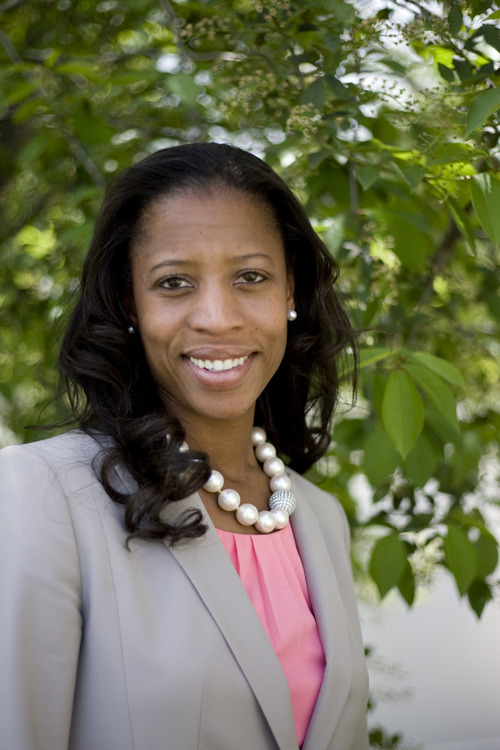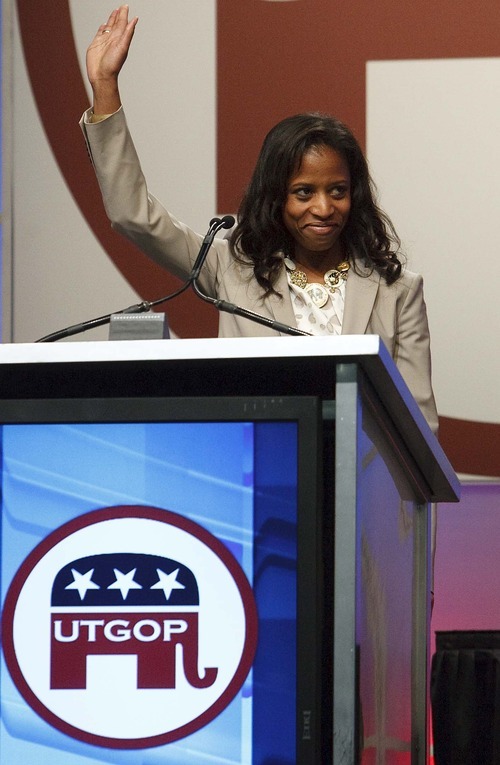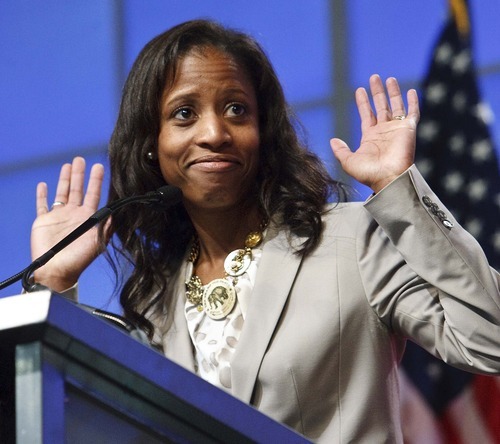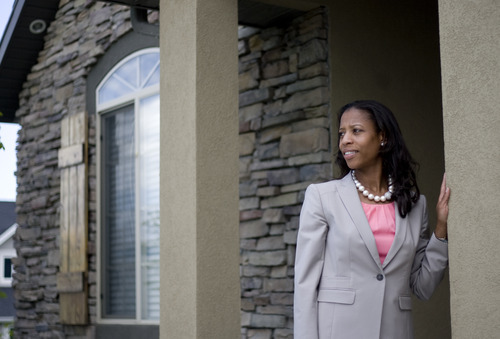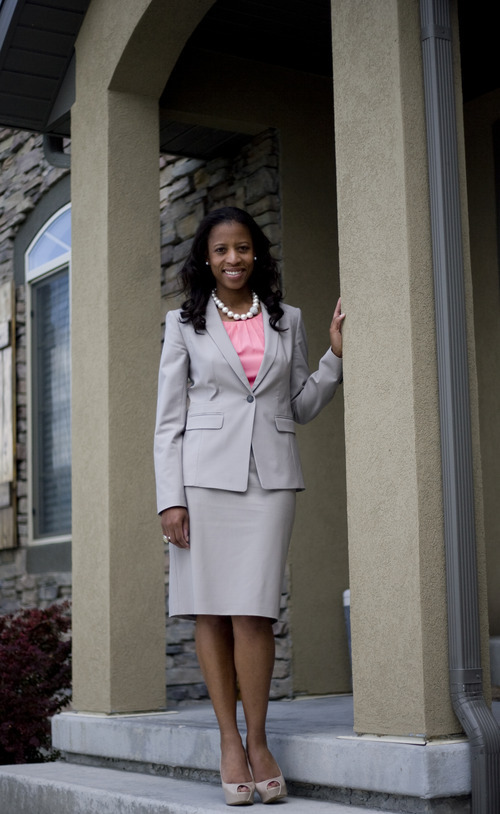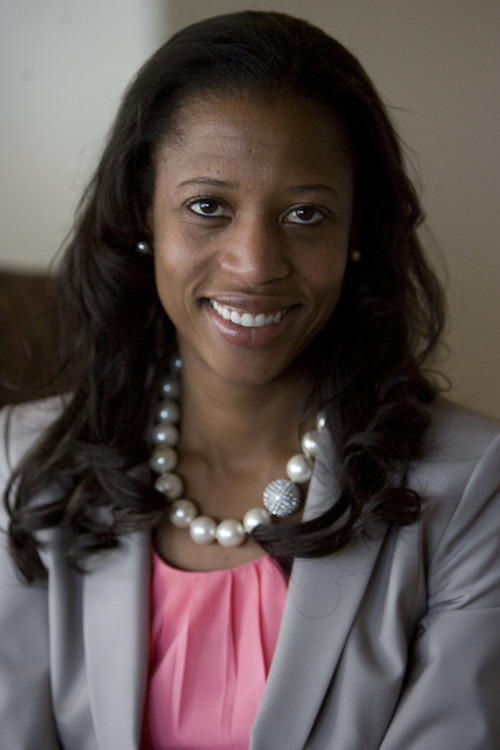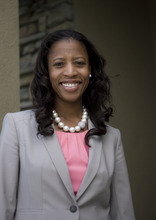This is an archived article that was published on sltrib.com in 2012, and information in the article may be outdated. It is provided only for personal research purposes and may not be reprinted.
Sandy • Roaming through displays of pup tents and khaki uniforms, neckerchief slides and outdoor gear, Jim Matheson shook hands and chatted up folks at the Scout-O-Rama, taking to heart the Boy Scout motto: Be Prepared.
He is preparing, in his seventh run for Congress, for a race that may be unlike any he has faced, running in a new district, again squarely targeted by national interests, and facing a candidate who has created a stir because of her profile as much as her policies.
Two weeks before Matheson was scouting for votes in Sandy, in the very same convention hall, Mia Love clinched the Republican nomination in Utah's 4th District. If the mayor of Saratoga Springs is elected, she would become the first black Republican woman in Congress.
It is a factor she downplays but is impossible to ignore, with there already being talk that the political newcomer could get a prominent speaking spot at the Republican National Convention in August.
But Matheson said he is approaching this election the same way he has every one since 2000 — talking to voters and driving home the point that he is an "independent voice" for the district.
"I don't see the difference between her and everyone else I've run against," Matheson said. "They're going to go back and walk the party line. They're not going to put Utah first, they're going to put the party first, and that's the difference in this race."
Love, however, says she is different than the other challengers who have fallen short against Matheson. She says her record as a mayor and city councilwoman in the town of about 18,000 gives her a different approach than other opponents and, she says, Matheson is out of touch with the values of the new district.
"Jim Matheson and his party, because let's be clear, he does vote with his party quite a bit, so there are some fundamental differences there," she said. "Here in Utah, we believe in conservative values. We believe in individual liberty. We believe in lower taxes. We believe in smaller government. Those are fundamentally different than Jim Matheson and the party of Jim Matheson."
Game on.
—
New district • After flirting with a potential run for governor or the U.S. Senate, Matheson jumped into the 4th District race after redistricting significantly changed his current 2nd Congressional District. He also calculated that the 4th District would be more favorable turf — both demographically and from a partisan breakdown.
Republicans hold a 13 percent edge in the 4th District, compared with 15 percent in his current 2nd District, making it the most GOP-friendly congressional seat held by a Democrat.
And Matheson will have to contend with a likely surge of Republican voters supporting Mitt Romney, the presumptive presidential nominee. Love's campaign has already been endorsed by Josh Romney and is expected to lock up the elder Romney's endorsement at some point during the race.
Love was in Washington last week meeting with party leaders and aggressively fundraising for her campaign.
David Wasserman, who monitors House races across the country for the Cook Political Report, said a tough race for Matheson got even tougher when Love won the nomination.
"There's no question that voters like [Matheson] personally … but Matheson's party affiliation is not popular in this district," Wasserman said. "Love may be a tougher target not only because she has a short political résumé, but because her appeal transcends, and Republicans will want to point to her as an example of their outreach."
Brock McCleary, deputy political director with the National Republican Congressional Committee, said Utah's 4th District is one of the party's top targets in the country and the party will "spare no expense" to get Love elected.
"I think Matheson has encountered an unfortunate set of circumstances that have come to bear in this one year. And to make things really unfortunate for him, he drew Mia Love," McCleary said. "When we try to figure out why we never beat him in the past, I think we had underfunded, uninspiring candidates. We allowed Matheson to eat into soft Republicans, Republican women. We think Mia Love puts that Republican coalition back together whole and more."
—
Matheson's moderates • Quin Monson, associate director of the Center for the Study of Elections and Democracy at Brigham Young University, said it would be a mistake to underestimate Matheson, who has always run strong among Utah's independent voters and even moderate Republicans.
"I think the race in part hinges on how Mia Love is defined and whether she can get back the moderate Republicans that Matheson has been so adept at winning," Monson said.
Leading up to the convention, he said, Love came across as a "typical red-meat conservative."
Love might move to the center, Monson said, but it "does open the door for Matheson to paint her as too conservative and his regular 'I'm-a-moderate' approach that attracts Republican votes."
"I've made a point of making sure everyone knows this is a big tent," Love said. "I'm not polarizing. Everyone's welcome, and I'm certainly not focusing on every issue under the sun." Her campaign is emphasizing the federal debt and deficit, energy development and tax reform.
Matheson, meantime, has already sought to paint Love as an extreme conservative, pointing to her support for eliminating the Department of Education, the Department of Energy and the Environmental Protection Agency. She also wants to give states control of Medicare and Medicaid.
"I think he has to say what he needs to say to try to win the race. To me, there's nothing extreme about what I'm trying to do," Love said. She said it's part of the process of getting the nation's budget in order.
"We're not going to catastrophically just chop everything," she said. "Let's be clear: I do believe there is a role that government plays. … I worked, for crying out loud, about nine years in government, but I think government should be limited."
Another issue they have sparred over — at least from a distance — is federal health reform. Love says Matheson voted against repealing the bill, while she would vote to repeal the federal health care reform every chance she got.
Matheson voted against the federal health reform when it passed and has voted to repeal portions of the bill. But he said a complete repeal would mean getting rid of good changes, like prohibitions on denying health care to those with pre-existing conditions.
"Everywhere I go in Utah, people don't want that," he said. "Someone advocating outright repeal, they're telling everyone in Utah who has pre-existing conditions, 'Guess what? We're going to take that right away from you,' and I'm not going to do that."
Matheson will be banking on voters like Kathi and Homer Robertson if he hopes to win. The Robertsons are Scout leaders whom Matheson represented from 2001 to 2003, when redistricting last shuffled the boundaries.
"We liked Congressman Matheson when he was our congressman before. Even though we're pretty conservative, I like the fact that he puts Utah first," Kathi Robertson said. "We're really glad to have him back. … He's a proven commodity."
Homer Robertson said he'll listen to Love, but "she will have to convince me."


